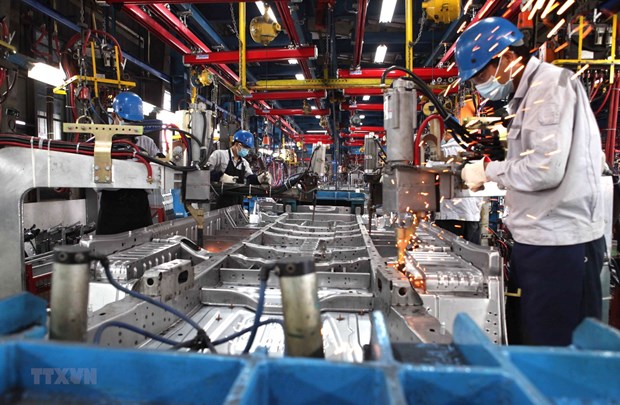Vietnam Business Forum to connect domestic, foreign enterprises
Connecting enterprises at home and abroad for common interests is the aim of the Vietnam Business Forum (VBF) held in Hanoi on July 4, Chairman of the Vietnam Chamber of Commerce and Industry (VCCI) Vu Tien Loc and Vice Chairman of the European Chamber of Commerce in Vietnam (EurcoCham) Tomaso Andreatta have affirmed.
 An automobile manufacturing plant in Vietnam (Illustrative image. Source: VNA)
An automobile manufacturing plant in Vietnam (Illustrative image. Source: VNA)Hanoi (VNA) – Connecting enterprises at home and abroad for common interests is the aim of the Vietnam Business Forum (VBF) held in Hanoi on July 4, Chairman of the Vietnam Chamber of Commerce and Industry (VCCI) Vu Tien Loc and Vice Chairman of the European Chamber of Commerce in Vietnam (EurcoCham) Tomaso Andreatta have affirmed.
At a press conference in Hanoi on July 3 ahead of the event, the officials said the VBF includes three main sessions focusing on building value chains, addressing technological challenges, and developing financial resources for sustainable growth.
The forum serves as a dialogue mechanism between the Government of Vietnam and the national and international business communities to improve business conditions necessary to foster the development of private enterprises, facilitate investment environment, and contribute to sustainable economic growth.
According to Tomaso, the connectivity between domestic businesses and foreign direct investment (FDI) ones requires business restructuring because most of the Vietnamese companies are operating at a small scale and they are short of experience in sales of high-quality products with reasonable prices.
Companies at home need international-standard management capacity and assistance from training schools, service, banking, insurance and technology companies, something not easy due to legal barriers, he said.
In fact, many foreign firms are concerned about issues relating to intellectual property rights and dispute solution. The Vietnamese Government could do a lot to ease these problems, he added.
Loc suggested the country focus on economic institutional reform and business environment improvement in addition to prompting import-export activities and seizing new trade and investment opportunities.
He noted that not all ministries, departments and localities nationwide take concrete actions to reform administrative procedures and improve business climate as directed by the Government.
For example, after four years of the implementation the National Single Window (NSW) mechanism, the number of administrative procedures deployed remains at 47 out of the total 245.
The number of items removed from the specialized inspection category accounts for less than 6 percent.
Among the 164 lists of goods subject to specialized inspection, up to 63 items have yet been officially promulgated by ministries and relevant departments.
The average time for specialized examination is 76 hours per procedure, three times that of ASEAN-4 countries (Indonesia, Malaysia, the Philippines and Thailand).
Loc stressed that the Government has requested all ministries and relevant departments to reduce and simplify half of the business requirements, and suggested strengthening cooperation mechanism between the State management agencies and the businesses.
Besides reforming administrative procedures, improving trade and customs procedures and specialized inspections, ministries and relevant departments should make the maximum use of opportunities from commitments and execution of new-generation trade agreements, including the Comprehensive and Progressive Agreement for Trans-Pacific Partnership (CPTPP).
This will help create breakthroughs in reforming the legal system and economic institutions comprehensively as well as bring about numerous opportunities and bright prospects for the country’s economic development, Loc affirmed.-VNA













